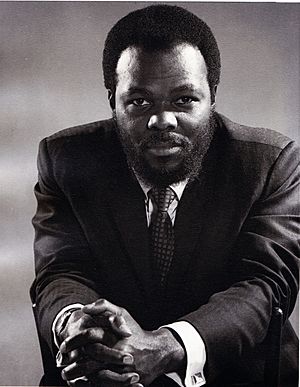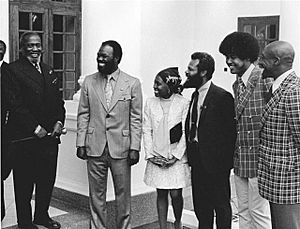Roy Innis facts for kids
Quick facts for kids
Roy Innis
|
|
|---|---|

Innis circa 1970
|
|
| 4th National director of the Congress of Racial Equality | |
| In office 1968 – January 8, 2017 |
|
| Preceded by | Wilfred Ussery |
| Succeeded by | TBD |
| Personal details | |
| Born |
Roy Emile Alfredo Innis
June 6, 1934 Saint Croix, U.S. Virgin Islands |
| Died | January 8, 2017 (aged 82) New York City, United States |
| Cause of death | Parkinson's disease |
| Political party | Libertarian (1998–death) Democratic (1986–1998) |
| Spouse | Doris Funnye Innis |
| Children | 10, including Niger Innis |
| Occupation | Activist and politician |
Roy Emile Alfredo Innis (born June 6, 1934 – died January 8, 2017) was an American activist and politician. An activist is someone who works to bring about social or political change. He was the National Chairman of the Congress of Racial Equality (CORE) from 1968 until he passed away. CORE is an important civil rights organization.
One of his sons, Niger Roy Innis, also works for the Congress of Racial Equality as their National Spokesman.
Contents
Roy Innis's Early Life
Roy Innis was born in Saint Croix, which is part of the U.S. Virgin Islands, in 1934. When he was 13, in 1947, he moved with his mother to New York City. He went to Stuyvesant High School and graduated in 1952.
At the age of 16, Innis joined the U.S. Army. He served for two years and received an honorable discharge when he was 18. After the army, he studied chemistry at the City College of New York. He later worked as a research chemist at Vick Chemical Company and Montefiore Hospital.
Early Work for Civil Rights
In 1963, Roy Innis joined the Harlem chapter of the CORE. CORE is a group that works for equal rights for all people. In 1964, he was chosen to lead the chapter's education committee. He believed that communities should have more control over their schools. He also supported the idea of "black empowerment," meaning that Black communities should have more power and control over their own lives.
In 1965, he became the Chairman of Harlem CORE. He worked hard to create an independent Board of Education for Harlem. This would give the community more say in how their schools were run.
In 1967, Innis became a special researcher at the Metropolitan Applied Research Center (MARC). Later that year, he was elected as the Second National Vice-Chairman of CORE. He also helped start the Harlem Commonwealth Council (HCC). This group aimed to help develop businesses and skills in upper Manhattan and Bronx communities.
Leading CORE
Roy Innis became the National Chairman of CORE in 1968. This was after a meeting where there was a lot of discussion. When he first took charge, Innis strongly supported black nationalism. This idea focused on the unity and self-determination of Black people.
Some white CORE members left the group around 1965. This happened as the movement, under Innis's influence, became more focused on Black leadership. Later, under Innis's leadership, CORE supported Richard Nixon for president in 1972. This marked a shift in the organization's political direction.
Roy Innis's Political Work
Innis helped write a bill called the Community Self-Determination Act of 1968. A bill is a proposed law. Many members of the U.S. Senate and over 50 congressmen supported this bill. This was a big moment because it was the first time CORE, or any civil rights group, wrote a bill and had it introduced in the United States Congress.
When people were debating about school integration, Innis suggested a different idea. He believed that local communities should control their own schools. In 1970, CORE sent a special legal document, called an amicus curiae brief, to the U.S. Supreme Court. This document was about a case called Swann v. Charlotte-Mecklenburg Board of Education.
In 1971, Innis and other CORE members visited seven African countries. He met with leaders like Kenya's Jomo Kenyatta and Tanzania's Julius Nyerere. He even met Uganda's Idi Amin, who was given a lifetime membership to CORE. Innis met these leaders to help find job opportunities in Africa for Black Americans. In 1973, he was the first American to officially attend a meeting of the Organization of African Unity (OAU).
Political Campaigns
In 1986, Innis ran for Congress in New York, challenging Major Owens in the Democratic primary election. He did not win this election.
In 1993, Innis ran for mayor of New York City in the Democratic Party primary. He challenged the mayor at the time, David Dinkins, who was the first African-American mayor of the city. Even though Innis had some conservative ideas, he explained that the Democratic Party was the main political party in New York City. He also attended fundraising events for the Republican candidate, Rudolph Giuliani. Innis received 25% of the votes in that election.
In 1998, Innis joined the Libertarian Party. He thought about running for Governor of New York as their candidate that year. However, he decided not to run because he needed to focus on his work with CORE.
Innis also helped with Alan Keyes's presidential campaign in 2000, serving as the New York State Chair.
His Passing
Roy Innis passed away on January 8, 2017. He was 82 years old. He died from Parkinson's disease, which is a condition that affects the brain and movement.
 | Janet Taylor Pickett |
 | Synthia Saint James |
 | Howardena Pindell |
 | Faith Ringgold |


